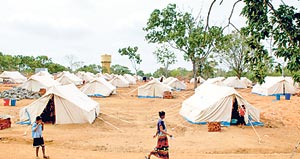| A year has passed since South Asia’s longest civil war ended with the Sri Lankan government armed forces crushing the Tamil Tigers. In its wake, the war’s last leg left about 300,000 people homeless in the island’s north.
According to the latest assessment report of the United Nations Office for the Coordination of Humanitarian Affairs (UNOCHA), 76,568 of the displaced still continue to reside in temporary camps run by the government. While the remaining 214,227 people who had been sent out of camps in the last few months have landed in their places of origin across the northern, eastern and central provinces, majority of them are without livelihood. Approximately 93,329 displaced persons have been residing with families that have hosted them since they moved out of the camps. Two words – rehabilitation, resettlement - have become the most popular words in Sri Lanka’s context, since the end of war.
 |
| Refugee camp in Pudukuduirippu |
Issues related to rehabilitation and resettlement comprised a session theme at an international conference on Sri Lanka organized by New Delhi based think-tank Observer Research Foundation (ORF) in the Indian capital last week. Sumanasiri Liyanage who teaches political-economy at the University of Peradeniya was among the several academics who attended the seminar, presenting their thoughts on post war subjects. Dr Liyanage says that reasons such as demining and infrastructure development have slowed down the resettlement process. “But these are not the only reasons that have made the process sluggish,” he says.
According to Dr Liyanage, “Over securitization of the State, not allowing international NGOs to work in war affected areas or even restricting the movement of war displaced people are reasons that have affected the pace of resettlement.” In his presentation at the ORF seminar, Dr Liyanage argued that a key aspect of the resettlement process was to tackle the “dependency syndrome” of the displaced people. The overt dependence on the government was seemingly making the displaced people less confident about themselves.
In a separate session on the political process vis-a-vis the 13th Amendment to the Sri Lankan Constitution, other speakers at the ORF conference tried to address the larger question of whether the political process could be de linked from the processes of resettling, rehabilitating and integrating community.
While inaugurating the ORF conference on May 10, India’s Foreign Secretary Nirupama Rao said that a political settlement was not a zero-sum game. “It need not and should not come at the cost of another. The 13th Amendment was designed to provide for considerable devolution of powers to the provinces. This Amendment has gained broad acceptance and has become the fulcrum around which the provincial administration revolves. There is consequently, a need to strengthen and empower these provinces further. India’s own experiment with democracy has taught us that effective devolution of powers, equal status before the Constitution, equal access to opportunities and addressing of minority concerns ensure that fissiparous forces are contained and differences addressed in an open and democratic fashion,” Mrs Rao was quoted as saying in a statement released to the Indian media in Colombo.
Ahilan Kadirgamar an activist with the New York based Sri Lanka Democracy Forum says that Sri Lanka needs further democratization and a political settlement to ensure lasting peace. “While a political solution that truly addresses the grievances and aspirations of the minorities in Sri Lanka would entail substantial devolution of power to the regions and power sharing at the centre, the likely scenario going forward looks to be one of incremental constitutional changes beginning with the implementation of the 13th Amendment,” Dr Kadirgamar says.
When asked whether the Tamil diaspora was engaging positively in Sri Lankan politics, he says, “Dominant sections of the diaspora are not playing a constructive role with respect to concerns of Tamils and other minorities inside Sri Lanka.
A few days ago, Sri Lankan External Affairs Minister G L Peiris had met Tamil National Alliance (TNA) leader R Sampanthan in Colombo to probably discuss ways in which the government might be able to engage with the mainstream Tamil political party. After the military defeat of the LTTE last year, the TNA no longer holds on to its politics of separatism. But even as the TNA tries to find its ground in the post LTTE era, issues of contention remain. “Everyone knew right from the beginning that the 13th Amendment was a non starter,” says TNA parliamentarian Suresh Premachandran.
The government’s proposal of a second chamber in Parliament would have to be watched for its intent and composition, he adds. During her speech at the ORF seminar last week, Mrs Rao who had served two previous stints in Sri Lanka (also as India’s high commissioner from 2004) had said that there was also an apprehension that things may not quite work out the way it should and yet another opportunity may slip away. “But, one thing is evident – there is now a historic opportunity to shape the destiny of Sri Lanka and its people,” she added. Mrs Rao was here, she should know. |


